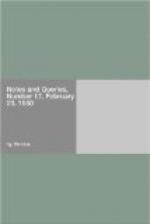“Gueius Pompeius Magnus
et scribebat et dicebat Kadamitatem
pro Kalamitatem.”—(Quoted
from Bothe’s Poetae,” Scenici
Latinorum, vol. v. p.
21.)
But how is the -amitas to be explained? I may as well add, that Doederlein, with his usual felicity, derives it from [Greek: kolouo].
EDWARD S. JACKSON.
I beg to refer MR. F.S. MARTIN (No. 14. p. 215.), for the derivation of “Calamity,” to the Etymologicon Linguae Latinae of Gerard Vossius, or to the Totius Latinitatis Lexicon of Facciolatus and Forcellinus. He will there find that the word calamitas was first used with reference to the storms which destroyed the stalks (calami) of corn, and afterwards came to signify metaphorically, any severe misfortune. The terrific hail-storm of the summer of 1843, which destroyed the crops of corn through several of the eastern and midland counties of this kingdom, was a calamity in the original sense of the word.
“W.P.P.” has also kindly replied to this query by furnishing a part of the Article on Calamitas in Vossius; and “J.F.M.” adds, Calamitas means—
“The spindling of the corn, which with us is rare, but in hotter countries common: insomuch as the word calamitas was first derived from calamus, when the corn could not get out of the stalk.”—Bacon, Nat. Hist. sect. 669.
Derivation of “Zero" (No. 14. p. 215.).—Zero Ital.; Fr. un chiffre, un rien, a cipher in arithmetic, a nought; whence the proverb avere nel zero, mepriser souverainement, to value at nothing, to have a sovereign contempt for. I do not know what the etymology of the word may be; but the application is obvious to that point in the scale of the thermometer below the numbered degrees to which, in ordinary temperatures, the mercury does not sink.
[Greek: Philologos]
Deanery of Gloucester, Feb. 7. 1850.
“Zero” (No. 14. p. 215.)—Zero, as is well known, is an Italian word signifying the arithmetical figure of nought (0). It has been conjectured that it is derived from the transposition from the Hebrew word ezor, a girdle, the zero assuming that form. (See Furetiere, vol. iii.) Prof. le Moine, of Leyden (quoted by Menage), claims for it also an Eastern origin, and thinks we have received it from the Arabians, together with their method of reckoning ciphers. He suggests that it may be a corruption from the Hebrew [Hebrew: rphs], safara, to number.
Complutensian Polyglot.—I cannot pretend to reply to “MR. JEBB’S” inquiry under this head in No. 12. p. 213.; but perhaps it may assist him in his researches, should he not have seen the pamphlet, to refer to Bishop Smallridge’s “Enquiry into the Authority of the Primitive Complutensian Edition of the New Testament, as principally founded on the most ancient Vatican MS., together with some research after that MS. In order to decide the dispute about 1 John v. 7. In a letter to Dr. Bentley. 8vo. London, 1722.”




